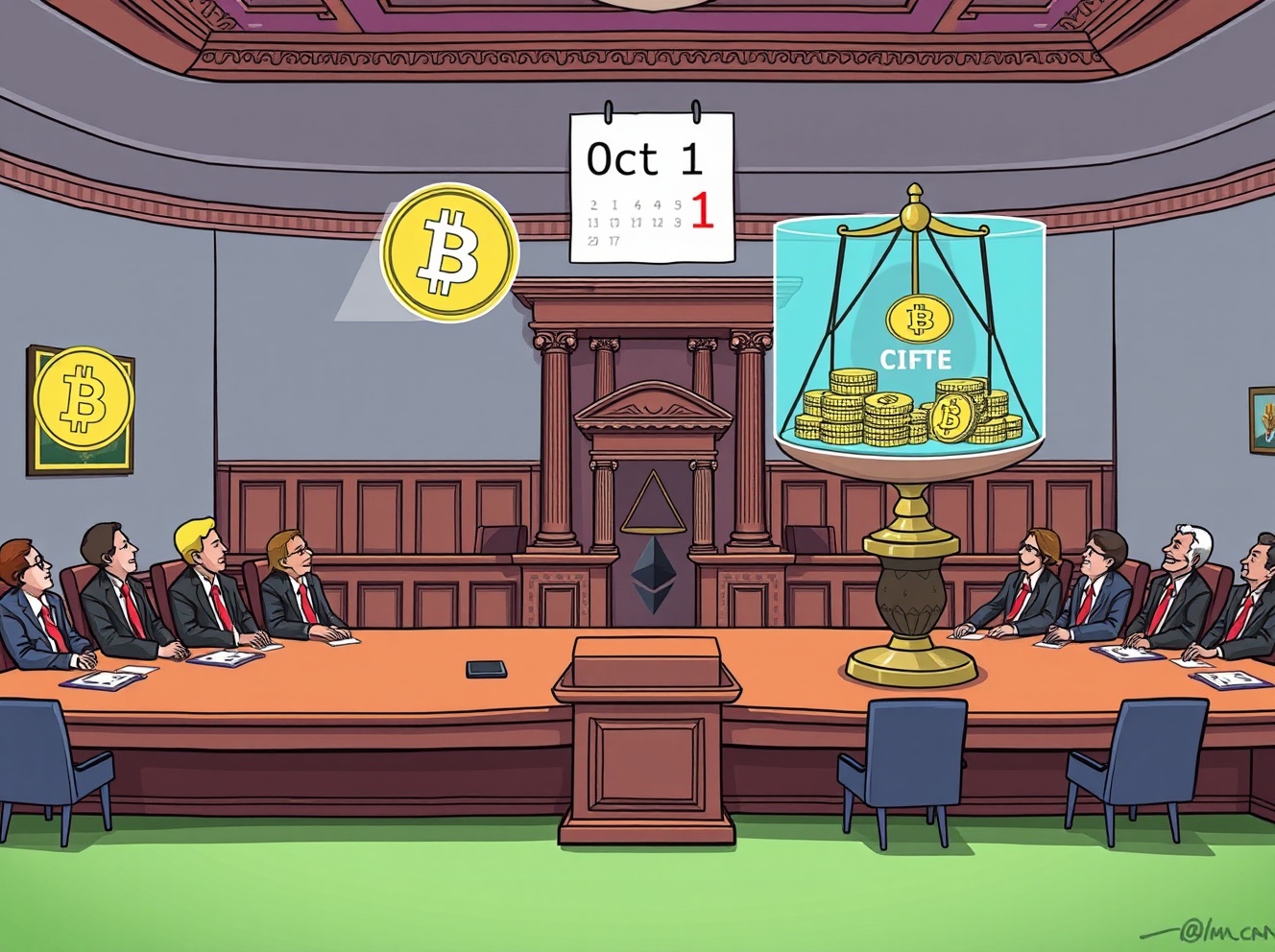Digital Asset Taxation: US Senate to Hold Crucial Hearing on October 1
0
0

BitcoinWorld

Digital Asset Taxation: US Senate to Hold Crucial Hearing on October 1
The world of cryptocurrencies is constantly evolving, and with its rapid growth comes increased scrutiny from regulators. A significant development is on the horizon: the U.S. Senate is set to hold a hearing on digital asset taxation on October 1, as reported by Walter Bloomberg. This event signals a critical step towards defining how digital currencies and other blockchain-based assets will be treated under the law, potentially impacting every investor and participant in the crypto space.
Understanding the US Senate’s Focus on Digital Asset Taxation
This upcoming Senate hearing isn’t just another discussion; it represents a crucial moment for the cryptocurrency industry. Lawmakers are increasingly aware of the need for clear guidelines surrounding digital assets, especially concerning their tax implications. As more individuals and institutions engage with cryptocurrencies, NFTs, and other digital assets, the current tax framework often struggles to keep pace.
The lack of consistent rules creates uncertainty for investors and makes compliance challenging. This hearing aims to address these ambiguities head-on, seeking to establish a more robust and understandable approach to digital asset taxation across the United States. It is a proactive move to ensure fairness, generate revenue, and protect consumers within this burgeoning financial landscape.
Why is Digital Asset Taxation So Complex?
Taxing digital assets presents unique challenges compared to traditional assets like stocks or real estate. Several factors contribute to this complexity:
- Defining “Asset”: Are cryptocurrencies property, currency, or a commodity? The classification impacts how they are taxed.
- Varying Transactions: Tax events can include buying, selling, trading, staking, mining, and even receiving airdrops. Each type of transaction can have different tax consequences.
- Global Nature: Digital assets transcend national borders, making it difficult to enforce uniform tax laws. Investors might hold assets across multiple jurisdictions.
- Record-Keeping: Tracking numerous, often small, transactions across various wallets and exchanges can be an arduous task for individuals.
- Valuation Challenges: The volatile nature of many digital assets makes accurate valuation at the time of a taxable event complex.
Addressing these points effectively is vital for any comprehensive digital asset taxation policy. The Senate hearing will likely delve into these intricacies, seeking expert opinions to forge a path forward.
What Could This Crucial Hearing Mean for Crypto Investors?
The outcome of the October 1 hearing could have far-reaching implications for anyone involved with digital assets. While it’s impossible to predict the exact legislative changes, we can anticipate several potential outcomes:
- Clearer Guidelines: Investors might finally receive more definitive rules on how to report various crypto transactions, reducing current ambiguities.
- New Reporting Requirements: There could be proposals for stricter reporting requirements for exchanges or individuals, similar to those for traditional financial assets.
- Impact on Innovation: The chosen approach to taxation could either foster or hinder innovation within the US crypto industry. A balanced approach is crucial.
- Increased Compliance: With clearer rules, there will be an expectation of higher compliance from investors, potentially leading to more enforcement actions for non-compliance.
It is imperative for crypto enthusiasts and investors to stay informed. Understanding the potential changes in digital asset taxation will be key to managing portfolios and ensuring adherence to future regulations. This hearing is a significant indicator of the government’s growing interest in regulating this space.
Preparing for the Future of Digital Asset Taxation
As the U.S. Senate prepares for this pivotal hearing, it is a timely reminder for all digital asset holders to review their current practices. While specific changes are yet to be determined, proactive steps can help you navigate the evolving regulatory landscape.
Here are some actionable insights:
- Maintain Meticulous Records: Keep detailed records of all your digital asset transactions, including dates, values, and types of activity (buy, sell, trade, stake, etc.).
- Consult Tax Professionals: Seek advice from tax advisors specializing in cryptocurrencies. They can offer guidance based on current laws and help prepare for potential changes.
- Stay Informed: Follow official announcements and reputable news sources regarding legislative developments.
- Understand Your Jurisdictions: Be aware of both federal and state-level tax obligations concerning your digital assets.
This hearing on digital asset taxation represents an opportunity for lawmakers to create a framework that supports innovation while ensuring a fair and equitable tax system. The discussions on October 1 will undoubtedly shape the future of how digital assets are integrated into the broader financial system.
In conclusion, the upcoming US Senate hearing on digital asset taxation on October 1 is a landmark event for the cryptocurrency sector. It underscores the growing mainstream recognition of digital assets and the urgent need for clear, comprehensive tax policies. The outcomes of this hearing will provide valuable insights into the future regulatory environment, affecting how individuals and businesses interact with cryptocurrencies for years to come. Staying informed and preparing for potential changes will be essential for all participants in this dynamic market.
Frequently Asked Questions (FAQs)
Q1: What is the main purpose of the US Senate hearing on October 1?
A1: The hearing aims to discuss and establish clearer guidelines and a more robust approach to digital asset taxation in the United States, addressing current ambiguities in tax laws related to cryptocurrencies and other digital assets.
Q2: Why is taxing digital assets more complicated than traditional assets?
A2: Digital assets pose unique challenges due to their varied classifications (property, currency, commodity), the diverse types of taxable transactions (trading, staking, mining), their global nature, difficulties in record-keeping, and the volatility that complicates valuation.
Q3: How might this hearing impact crypto investors?
A3: The hearing could lead to clearer tax reporting guidelines, new reporting requirements for exchanges or individuals, potential impacts on crypto innovation, and an expectation of increased compliance from investors.
Q4: What immediate steps can crypto holders take to prepare for potential tax changes?
A4: Crypto holders should maintain meticulous records of all transactions, consult with tax professionals specializing in cryptocurrencies, stay informed about legislative developments, and understand their tax obligations across relevant jurisdictions.
Q5: Will the October 1 hearing immediately change US tax laws for digital assets?
A5: No, the hearing itself is a discussion and information-gathering session. While it is a crucial step, it is unlikely to result in immediate law changes. It will, however, inform future legislative proposals and regulatory actions.
If you found this article insightful, consider sharing it with your network on social media. Your shares help spread crucial information about the evolving landscape of digital asset taxation and empower others to stay informed.
To learn more about the latest explore our article on key developments shaping cryptocurrency regulation and its future impact.
This post Digital Asset Taxation: US Senate to Hold Crucial Hearing on October 1 first appeared on BitcoinWorld.
0
0
 Manage all your crypto, NFT and DeFi from one place
Manage all your crypto, NFT and DeFi from one placeSecurely connect the portfolio you’re using to start.





